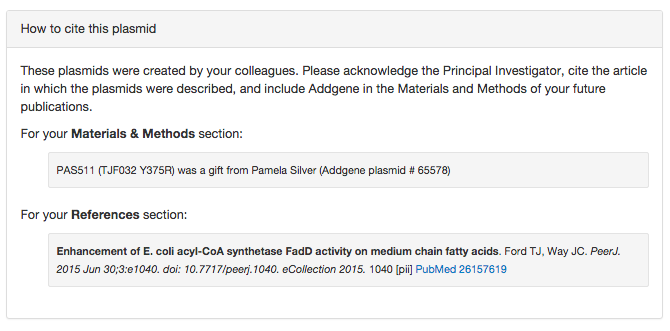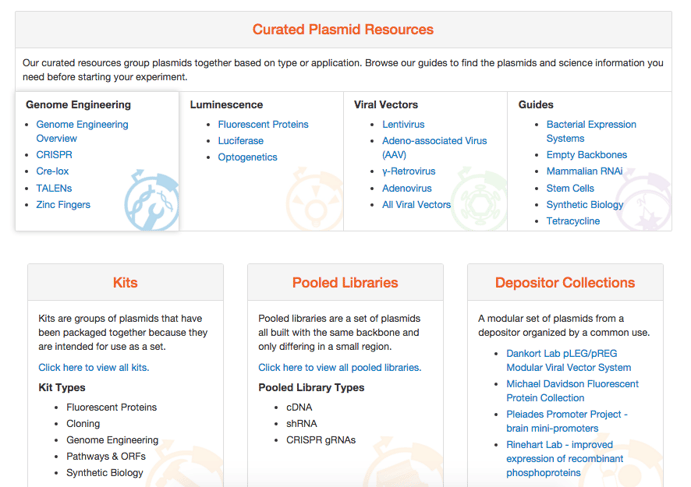 With many interesting articles coming out in a myriad of journals every week, it can sometimes be difficult for great work to gain prominence among all the noise. Scientists have a variety of metrics they can use to evaluate the impact of their work (H-index for instance), but these rely upon other researchers being able to find their publications in the first place. As a curator of the thousands of amazing plasmid technologies contributed by our depositors, Addgene strives to make it easier for you to find the plasmids and publications relevant to your research interests. We do this by promoting citation, supporting sophisticated search, and curating plasmid collections.
With many interesting articles coming out in a myriad of journals every week, it can sometimes be difficult for great work to gain prominence among all the noise. Scientists have a variety of metrics they can use to evaluate the impact of their work (H-index for instance), but these rely upon other researchers being able to find their publications in the first place. As a curator of the thousands of amazing plasmid technologies contributed by our depositors, Addgene strives to make it easier for you to find the plasmids and publications relevant to your research interests. We do this by promoting citation, supporting sophisticated search, and curating plasmid collections.
Addgene's "How to cite this plasmid" section
Anytime you use a plasmid from the repository, we request that you cite it using both its Addgene ID number as well as the reference for its original publication. To help facilitate this process, we explain how to cite plasmids from Addgene right on our plasmid pages and provide a citation that you can put straight into your reference section.
Why do this? Not only does citing plasmids from Addgene help others find them later if they need to use them in their own work, it also increases the visibility of both you and the original depositor. Our citations feature makes it so that, when you cite a plasmid from Addgene using its unique Addgene ID number, your publication will be listed on our website as a “Publication Citing this Plasmid” - this simple act directly associates you with a network of researchers who may be working on similar projects and should make it easier for them to find your work later.
We also hope that this feature will decrease redundancy. If you modify a plasmid from Addgene in a way that another researcher finds useful, that researcher will be able to easily find the fruits of your labor and won’t have to repeat the modification. This will save both time and money.
A quick note - While it is tempting to rely on the citation number when comparing two plasmids, we recommend reviewing the cited papers to determine whether the plasmid has been used in your system.
Sophisticated search
You can search for specific plasmids on our website using the search bar found at the top right of every page. You can search for plasmids by name, PI, Addgene ID number, or keyword. Although an initial search might give you many results, you can narrow your search results using the filters found on the right side of the search page. A great breakdown of our search functionality can be found in the following video:
Please remember that the accuracy and reliability of our search results depends upon you, our depositors, giving us as much information as possible during the deposit process.
Special collections pages
In an effort to make it easier for you to browse through the many plasmids in the repository, our scientists have curated a number of special collections pages. These pages serve to highlight plasmids that can be used for specific purposes. For instance, on our Optogenetics Collection page, you can find tables containing plasmids for expressing different types of rhodopsins and sensors as well as references and links to other resources.
If you think we’re missing an important collection or if you think a particular plasmid or type of plasmid is missing from our collections pages, please shoot us an e-mail at help@addgene.org. We’d love to hear your feedback.
Additional ways we get your plasmids out there
Beyond these 3 big pushes, we try to increase your work’s visibility in a few other ways. Every quarter we release a Newsletter where we spotlight some of the plasmids that have come through our doors in our “Hot Plasmids” section. We’ve also added the Plasmid of the Day feature to our home page - each day we showcase a new plasmid that you might otherwise miss. We hope this feature will draw attention to the great variety of plasmids in the repository. And last, but certainly not least, we often feature new plasmid technologies on our blog and encourage you to fill out this form if you’re ever interested in writing your own blog post about a plasmid or set of plasmids you’ve deposited with us. Don't forget to get yourself out there!
Additional Resources on the Addgene Blog
- Read How Notions of Scientific Impact Are Evolving
- Check out the Blog Post on Our Citations Feature
- Browse More Inside Addgene Posts
Additional Resources on Addgene.org
Topics: Addgene News, Using Addgene's Website








Leave a Comment